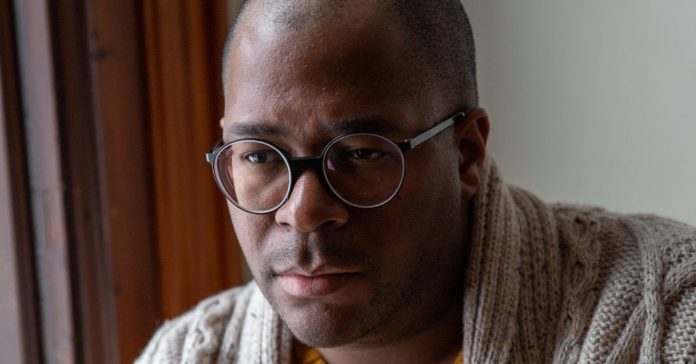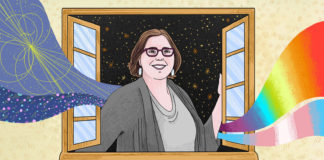
When he set out to write a novel, Brandon Taylor, a former doctoral student in biochemistry at the University of Wisconsin, approached it like a scientist.
“I have this very technical approach to almost everything,” he said during a video interview from Iowa, where he now lives. “If there is a problem, I first determine the parameters of the problem, and then I try to lay out a very systematic way of doing it.”
He started with a series of lists: Reasons he had failed to write a novel (too concerned with inventing everything, problems with setting and time frame). Things he considered himself good at (tone, dialogue). Scenes he wanted in the book (a tennis match, a dinner party). He gave himself rules, setting a goal to write 10,000 words a day. “It began in this very mercenary place,” he said, “but it moved to a place of genuine artistic interest.”
The result is “Real Life,” which Riverhead is publishing next week, a novel that merges two versions of him: Brandon Taylor the writer and Brandon Taylor the scientist.
When he was a boy growing up in a small community outside Montgomery, Ala., Taylor, now 30, dreamed of a career in medicine. “My entire life, I wanted to be a neurosurgeon,” he said. “Because if you’re a black boy from the South who is good at science, everyone is like, ‘Oh, Ben Carson, you should be a neurosurgeon.’”
[ Read Jeremy O. Harris’s review of “Real Life.” ]
For just as long, he has been writing. “As a kid, I was always writing little stories, or trying to, but I never considered myself a good writer,” he said. It hasn’t always been easy for him to reconcile these two aspirations. When he signed up for his first creative writing class, he remembers thinking, “They’re all English majors, and I study chemistry.”
But it was Taylor’s life as a scientist that enabled him to write “Real Life.”
He began working on it while he was in his graduate biochemistry program. He spent most of his days in the lab, working on his experiments on nematode worms, so he wrote mainly at night. It took him five weeks to finish a manuscript. At one point, he threw it in the trash after two agents rejected it. “It felt like the universe was telling me that I wasn’t good enough, and that my work wasn’t worth sharing with the world,” he said.
His roommate Antonio Byrd, a fellow Ph.D. student, fished it out. “I told him, I’m keeping this draft in my bedroom until you come to your senses,” Byrd said.
Taylor also deleted the manuscript files from his computer, attempting to scrub the book from his life. A few weeks later, he found out he had received a fellowship from the Tin House summer writing workshop. Encouraged, he went back to his novel, recovering it from one of his rejected queries. “That kind of seems like a sign, too,” he said.
Throughout his undergraduate years at Auburn University at Montgomery and graduate school in Wisconsin, he felt he had to choose between science or writing, and science often won. But when he received an acceptance letter from the Iowa Writers’ Workshop, he decided that, this time, writing would win. “I could survive not having science, but I couldn’t survive not having writing,” he said.
“Real Life” follows one pivotal weekend in the life of Wallace, a black gay biochemistry Ph.D. student in the Midwest. Grappling with the death of his father, a nascent romance with a straight friend, the potential failure of his scientific work and a general sense that he doesn’t fit into the predominantly white cohort of his university campus, Wallace must figure out whether he wants to continue on his path as a student or chart a different course.
[ This book was one of our most anticipated titles of February. See the full list. ]
Taylor knows that Wallace sounds a lot like him. Both are black gay scientists. Both are migrants to the Midwest by way of Alabama. Both have had confusing trysts with straight men. (“My life, in some ways, is just a series of inappropriate encounters with heterosexual men,” Taylor joked.) And both have stood on the precipice of a scientific career and had to ask whether to walk back or leap.
But Wallace — whose name is based on Mrs. Wallis from Ann Patchett’s novel “Commonwealth,” Taylor said — is not Taylor. Instead, Wallace is an amalgam of Taylor’s own experiences as well as those of other queer black people on college campuses, he said.
“We wanted to see us in a story, and we didn’t have that,” said Christopher Sprott, a friend and former roommate of Taylor’s who is also black and queer.
The academic setting is one that Taylor gravitates toward as a reader — some of his favorite novels include “The Idiot,” by Elif Batuman; “The Marriage Plot,” by Jeffrey Eugenides; “Harvard Square,” by André Aciman; and “Fates and Furies,” by Lauren Groff — but he rarely sees people like himself when he reads them. He hopes “Real Life” changes that. “What I wanted to do was to take this genre and this milieu that I really respond to as a reader and to sort of write myself into it,” Taylor said.
He channeled this desire into his first published piece of writing, the story “Cold River,” which appeared in 2015 in Jonathan, a literary journal published by Sibling Rivalry Press. He wrote the story as an undergraduate student, after he had gone to a bookstore in Montgomery but couldn’t find the queer books he was looking for. When he asked the clerk if they had them, he said, “the guy was like, ‘We’re a family store, we don’t stock that kind of stuff here.’”
Taylor considers himself primarily a short-story writer, but the desire to see people like him represented in literature led him to make his book debut with a novel. “I had this feeling no one was going to take me seriously until I write this novel,” he said. “I’m going to write a novel so that people will let me write short stories in peace.”
Stories are on the way. His next book is a collection, “Filthy Animals,” which will also be published with Riverhead.
But now that Taylor has made space for himself in the world of novels, maybe he’ll stick around, he said. “Over the summer, I was like ‘Oh, maybe I will write another novel.’”








